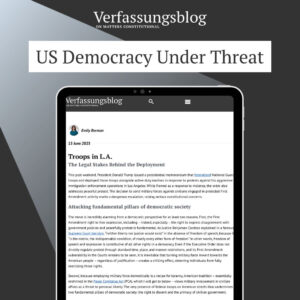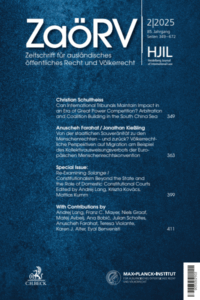The Failures of the NATO Summit and the Future of Peace
How European Leaders’ Obsequiousness Threatens Europe’s Security and Undermines International Law
Reflecting on the June 24-25 NATO summit in The Hague – one day after the 80th anniversary of the signing of the UN Charter –, it is difficult not to be overwhelmed by a sense of failure and depression. During the NATO Summit, the key topics under discussion included strengthening NATO’s deterrence and defense capabilities, increasing defense spending and building up the defense industry, and maintaining support for Ukraine. These are important issues. But there are three points that were conspicuously missing from the agenda.
First, the wavering position of the United States with regard to what it would do if Russia attacked NATO’s eastern flank. This concern is distinct from the broader question of whether the United States remains a Member of NATO and whether it will honor its Article 5 obligations. As the President rightly pointed out when pushed about his commitment to Article 5 on Air Force One, what that means is a question of interpretation. Article 5 requires that all Member States consider an attack against one Member State as an armed attack against all members and that each government will take the actions it deems necessary to assist the ally attacked. This does not commit the United States to send US troops to fight a conventional war with integrated forces along the lines that NATO has trained for since its inception. If the United States decided that it would instead deem it sufficient to keep sea lanes across the Atlantic open to ensure that weapons procured by European Members in the US could be duly delivered, and otherwise refuse to put US boots or equipment in play, this would arguably not be a violation of Article 5 – even if it would contradict established understandings.
These concerns are not merely hypothetical. Both the US President and the US Secretary of Defense are on record saying that the conventional defense of Europe should not be the business of the US. And the ongoing US Global Posture Review is widely believed to end up proposing significant reductions of US forces deployed in Europe. It is of central importance that the US administration commits to synchronizing any future US troop drawdowns with an agreed timetable allowing for increased European defense capabilities to take their place. No clarity was achieved on these central concerns.
Second, it was also not on the agenda that the leading Member of NATO, the United States, has openly threatened the independence of one Member State (Canada) and the territorial integrity of another (Denmark). Clearly the understanding of the alliance as a community of self-respecting sovereign states requires that such grotesque misbehavior of one of them, even if it is the most powerful Member, cannot be left unaddressed. A collective security alliance should be distinguishable from an assemblage of vassals seeking shelter under the military umbrella of an imperial power. That difference is enshrined in Articles 1 and 2 of the North Atlantic Treaty, firmly anchoring NATO in the principles and purposes of the United Nations. It would be timely for Members to remind themselves of these commitments and hold each other accountable with regard to their observance, and not just silently seek refuge in new security agreements, as Canada and the EU have done.
++++++++++Advertisement++++++++++++
Spotlight: US Democracy Under Threat
The US is facing a deep constitutional crisis.
Keeping up with recent developments isn’t always easy.
Our Spotlight Section, “US Democracy Under Threat,” brings together insights from leading legal scholars.
Open access, timely, and read by a global audience.
++++++++++++++++++++++++++++++++
That leads to a third point. On the occasion of a NATO meeting in The Hague, the home of both the International Court of Justice and the International Criminal Court, a day before the 80th anniversary of the UN Charter, there is something deeply depressing about the NATO Secretary General obsequiously congratulating the US President on a clearly illegal military strike in Iran (while the German Chancellor expresses his thanks to Israel for “doing the dirty work for us”). At the same time, NATO agrees to massively expand its core military spending to 3.5% (plus 1.5% for defense-related expenses) of its GDP by 2035, at a time when military spending is on the rise globally.
To be clear, as things are, that kind of commitment to military spending is not unreasonable for European States in the short to mid-term and indeed most states should raise their spending to that level well before the agreed upon 2035 deadline. But that should not detract from the fact that there is something deeply troubling about a situation in which it has indeed become necessary to raise defense spending in such a dramatic way. Might there be a link between the need to raise defense spending and the casual disregard for core norms of international law by NATO’s protagonists?
The point is not to tie together specific events or enter into a policy discussion regarding specific decisions in the past, but to suggest a wider and deeper failure, a failure of imagination: Why has it become so farfetched to imagine NATO Members deliberating on how they could contribute and bring reforms to a world in which the promise of the UN would have a chance to be realized, a world in which it would not be necessary for states to spend so much on defense? More concretely: Why was there no insistence by NATO States that military expenditure would have to be coupled with new efforts and initiatives in diplomacy and in diplomacy’s domestic and international infrastructure, including institutional reforms? Why not insist on a requirement that a state has an obligation to spend at least 10% or 15% of what it spends on defense on diplomacy, support of international institutions and foreign aid? The proposed defense budget in the US for 2026 has been raised to approx. $1 trillion, with State Department budget cut back to under $30 billion – roughly 3% of the defense budget. The deeply dysfunctional US tendency of the past two and a half decades to militarize its foreign policy should not be the model to emulate. And why was there no pressure put on those NATO States who have so far failed to accept the universal jurisdiction of the International Court of Justice and to join the International Criminal Court? The US administration should, at the very least, have been required to justify its decision to sanction the ICC for doing its job.
++++++++++Advertisement++++++++++++
The Luxembourg Centre for European Law (LCEL) is recruiting two post-doctoral researchers in EU law to join a growing team of lawyers with an interdisciplinary outlook, in a multilingual and international environment. The LCEL, led by Prof. Takis Tridimas, aims to produce outstanding scholarship that is impactful and addresses contemporary issues of concern to society.
The position is offered for an initial period of two years, with the possibility of extension for three additional years. More details, here.
++++++++++++++++++++++++++++++++
It is true: There are contexts in which to avoid war, you have to prepare for war – si vis pacem, para bellum. But it is always also true that to achieve peace, you have to imagine its possibility, support and build the legal structures that help assure it, persistently work towards and invest in it – si vis pacem para pacem. That was what President Roosevelt understood when he brought the US into the Second World War in 1941 and simultaneously started to plan for a new world order for the time after the war. By the time World War II ended, the United Nations as well as other multilateral institutions had been established to provide a framework for future work towards disarmament and peace. Whereas the North Atlantic Treaty States clearly state its commitment to that new world of international law, there is little indication that NATO Member States today are engaging with what it would mean to take those commitments seriously.
In the end, there can be no stable and believable NATO alliance without a shared commitment to international law. A state will only take an armed attack on another Member State as an attack against itself if they share the sense of violation of a core norm of international law – one that cannot be tolerated. If only geostrategic or economic considerations underpin the alliance, it is doomed. The assessment of such factors in the highly dynamic contemporary political context – as opposed to the times of the Cold War – depends heavily on the particular orientation of a government. This is not a stable foundation for an alliance.
Of course, it is no mystery that these points were not brought up at the NATO meeting. Addressing any of them would have led to an acrimonious meeting and might even have accelerated the end of NATO as a US-led alliance. Yet, not facing these issues now only makes things worse and European security even more precarious than it already is.
If European States are about to spend significantly more money on defense, as they have good reasons to, they need to know what existing resources and contributions they can rely on and what they need to provide for themselves to ensure independent capacities. Additionally, if the US is not a reliable part of the alliance and indeed takes hostile positions against core Member States’ interests, weapons systems should presumptively not be procured in the United States. And the enduring presence of US bases on European territory would be an issue which would also have to be addressed.
In times of crisis and uncertainty, it is necessary to heed basic principles, find orientation and seek clarity about how things are, what one should orient oneself towards and what needs to be done. Without such clarification, with European leaders unable or unwilling to face these realities, Europe’s security remains precarious. Worse still, there will be little hope for changes to strengthen Europe’s defensive capacities and NATO’s role as a regional organization committed to the principles of the UN Charter through successful collective action. With the United States on board if possible, and without it if necessary.
*
Editor’s Pick
by EVA MARIA BREDLER

How to write about a world that feels broken? Richard Powers did a brilliant job in “Bewilderment”. Set in a near-future US that now looks all too familiar – escalating climate crisis, tightening authoritarianism, gutted science budgets –, widowed astrobiologist Theo Byrne searches for life on distant exoplanets while trying to protect the planet he loves the most, his nine‑year‑old son Robin. The boy’s grief‑fuelled outbursts make the school system eager to medicate him, so Theo turns to an experimental neuro‑feedback therapy instead. The therapy trains Robin’s brain to mimic the recorded patterns of his late mother, an animal rights activist, and transforms Robin’s view of the world – and the reader’s. A word of warning: this novel may both widen your heart and break it, leaving you listening to birdsong rather than scrolling the news.
*
The Week on Verfassungsblog
summarised by EVA MARIA BREDLER
MATTIAS KUMM rightly pointed out that “to achieve peace, you have to imagine its possibility, support and build the legal structures that help assure it, persistently work towards and invest in it”. The transitional justice process in Sudan is another case in point. Last week, the UN warned of a catastrophic surge in violence in the war that has plagued the country since 15 April 2023. GERRIT KURTZ (ENG) shows why Sudan’s most recent transition process failed – and what future efforts must learn.
While the German Bundestag voted to suspend family reunification for beneficiaries of subsidiary protection today, the CJEU pushed for stronger protection of migrant families in Kinsa. The long-awaited judgment marks a rare rights-based correction to the EU’s punitive approach to migration, drawing clear constitutional limits on the criminalisation of those who cross borders caring for children. STEFANO ZIRULIA (ENG) analyses how Kinsa repositions proportionality as a check on the EU’s migration enforcement regime.
Citizenship is another powerful tool for structuring and controlling migration. 2025 has seen multiple governments seeking to alter their citizenship attribution policies. In their quest to ensure “authentic” citizenship bonds, governments should be guided by the principles of certainty, agency, and commitment, argues FRANCESCA STRUMIA (ENG), narrating the common story of some unlikely characters: Russian oligarchs in Malta, descendants of Italians in South America, and Mexicans crossing into the US.
On Tuesday, the German Federal Administrative Court lifted the ban on Compact GmbH, an association publishing, amongst other things, the Compact magazine, parts of which have been classified as far-right. In June 2024, the Federal Ministry of the Interior had banned Compact-Magazin GmbH and its affiliate on the grounds that they were acting against the constitutional order. The Court found that although the association identifies with the so-called “remigration concept”, which violates human dignity and the principles of democracy, this “anticonstitutional” content does “not yet” represent a threat to the state. While the court maintains that association law is applicable to de facto media bans, it indicated a significant boundary to this interpretation, as PAULA RHEIN-FISCHER (GER) observes.
Another long-awaited decision was rendered last week: in United States v. Skrmetti, the US Supreme Court upheld a Tennessee law banning gender-affirming care for minors. RYAN THORESON (ENG) explains how the Skrmetti decision threatens to narrow the scope of constitutional equality protections in the United States, why it is dangerous for the equality claims of women and lesbian, gay, and bisexual people, and why it is likely to be so damaging for transgender people targeted by state and federal lawmakers in recent years.
Building on Thoreson, DARA E. PURVIS (ENG) examines how the Court narrows what counts as sex discrimination – in particular, the concurrences written by the ultraconservative members of the Court confine the reach of equal protection to formal legal classifications alone.
++++++++++Advertisement++++++++++++
Zeitschrift für ausländisches öffentliches Recht und Völkerrecht (2/2025)
Now available here!
++++++++++++++++++++++++++++++++
A similar ideology dominates Slovak Prime Minister Fico’s renewed attempts to amend Slovakia’s constitution. Last week, he tried to add a national identity clause and a definition of sex as strictly binary. Despite some opposition support, it narrowly failed – for now. Meanwhile, MAX STEUER (ENG) warns that defeatism could weaken a key safeguard: the still powerful Constitutional Court.
And even international dangers might be tamed by domestic means: while States are withdrawing to nationalism, domestic courts are stepping up where international justice fails. The conviction of Syrian doctor Alaa M. by a German court shows how national trials can deliver accountability. ANTONIA SCHLESINGER(ENG) uses the occasion to demonstrate how universal jurisdiction is reshaping international accountability.
International accountability proves especially tricky in international waters. Sabotage and signal interference in the Baltic Sea are on the rise, often involving Russia’s shadow fleet. But can navies and coast guards actually intervene? As MORITZ VON ROCHOW (GER) reveals, a dormant but still valid rule in piracy law may give Baltic Sea states surprisingly far-reaching authority.
Russia’s ongoing violations of international law elsewhere prompt other sanctions. The European Commission proposed banning Russian gas imports under Article 207 TFEU, aiming to bypass vetoes from Slovakia or Hungary. VIKTOR SZÉP and LUKAS SCHAUPP (ENG) warn that the strategy risks placing sanctions on shaky legal ground.
New threats require innovative lawyering, argued ARMIN VON BOGDANDY and LUKE DIMITRIOS SPIEKER two weeks ago, developing a proposal suggesting that Hungary’s threat to block the renewal of EU sanctions against Russia might be met with a legally grounded neutralisation of its veto. MARTIJN VAN DEN BRINK and MARK DAWSON (ENG) have read the text carefully and argue: the proposal enters a new and potentially dangerous galaxy and might be better characterised as illiberal rather than innovative.
Meanwhile, the legal ground is pretty shaky for a tool some might consider the opposite of sanctions: “golden shares”. Where sanctions sever ties, golden shares bind, allowing influence where sanctions exclude. The Trump Administration just secured such a golden share in U.S. Steel. TIM OSWALD (ENG) warns: the EU should resist reviving these shares as tools of economic nationalism and instead focus on Foreign Direct Investment screenings.
Last month, the European Commission presented a reform proposal for the General Data Protection Regulation. Some companies may soon no longer be required to keep records of their data processing activities. SEBASTIAN BRETTHAUER (GER) explains why the Commission’s proposal falls short – and why it could create new challenges instead.
And finally, we are pleased to share with you our Annual Report for 2024 (GER) as well as the Final Report for the Thuringia Project (GER) this week. In these two reports, we provide a comprehensive overview of our activities and projects from the past year, our financial developments, and the numerous achievements of the Thuringia Project. Our heartfelt thanks to all our partners and supporters for your trustful collaboration and support. It enables us to have a small part in building the legal structures we need in our times, “to persistently work towards and invest” in a peaceful (international) legal order, and to keep imagining its possibility.
*
That’s it for this week.
Take care and all the best!
Yours,
the Verfassungsblog Team
If you would like to receive the weekly editorial as an e-mail, you can subscribe here.






